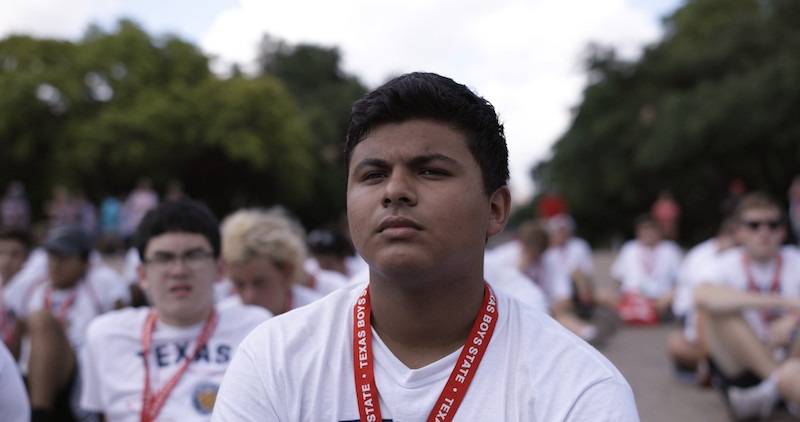
Picture CPAC (the Conservative Political Action Conference) meeting Lord of the Flies meeting a Richard Linklater film and you get a sense of the rollicking new documentary Boys State.
Every year, in Texas, thousands of promising young men—high school seniors—gather to learn about the Democratic process and essentially cosplay a real election. They break into two made-up parties, the Federalists and the Nationalists. There are delegates and party leaders and, most coveted of all, a governor, the highest elected office.
The event is sponsored by the American Legion and has been going on for decades. Dick Cheney was a participant. So was Bill Clinton.
Because the event takes place in Texas, the boys are overwhelmingly conservative. They care deeply about the second amendment. They “back the Blue.” When they talk about “abortion” (as in, “A big issue for me is abortion”) it is understood that they mean they are anti-abortion. Some favor Texas secession although the most serious among them reject that policy.
They’re loud and rowdy and jocular, but they are mostly good kids—after all, they’re voluntarily spending a week of their lives learning about American Democracy. That said, it’s crazy seeing young people who are so reflexively conservative. It’s like a birthright to these boys. (And yes, in case you were wondering, there is a female equivalent of the retreat called Girls State.)
The filmmakers, Amanda McBaine and Jesse Moss, focus mostly on four boys—and they’ve chosen wisely.
There’s Ben, possibly the most politically savvy of the bunch, a kid who has Ronald Reagan figurines in his bedroom and who intuitively understands how to use bare knuckles campaign tactics to win. Ben is wealthy, handsome, and Jewish—but he is also disabled. A bout with meningitis as a child left him with no legs and a deformed arm (he gets around pretty nimbly on prosthetics). As a result, he’s a firm believer in rugged individualism. Any notion that a person can be oppressed by society is nonsense to him. Look at me, he insists: I have so many disadvantages and look how accomplished I am! He expresses this worldview to his somewhat amused parents as he packs up his stuff for Boys State in what appears to be a sprawling mansion.
Next there’s Robert, a floppy-haired Matt Dillon lookalike, who is not quite what he seems. At first, you think you have his number: handsome, athletic, effortlessly popular. He uses a kind of jocky bonhomie to get signatures for his governor campaign and shouts out chest-thumping messages of American exceptionalism to the appreciative boys. But in private interviews, he proves to be more thoughtful, and interesting, than he initially appears.
Then there’s René, a most extraordinary young man, who seems to be 17 going on 45. (He even wears tiny wire-rimmed glasses low on his nose, like a pair of starter reading glasses.) René is Black and liberal, which already puts him in the .01 percentile of his peers. (“Call me if you want to come home,” he says his mother advised him before he left.) He’s also exceptionally brilliant—hyper articulate, serious, with a slight chip on his shoulder that comes from always knowing he’s the smartest kid in the room. René is elected the chairman of the Nationalist party (Ben is the leader of the Federalist party)—and is almost immediately met with resistance, at least some of which is rooted in racism.
Finally, there’s the film’s true protagonist, the idealist Steven, a son of Mexican immigrants, who got his passion for politics by attending a Bernie Sanders rally, no less. Like René he’s an outsider among his peers—not just because he’s Mexican, but because his politics lean left. That said, Steven is a natural born politician, in the best sense of the word—he really wants to listen and learn and earn people’s trust and vote. At first, his earnestness seems no match against Robert’s frat boy charms, but it turns out these rowdy kids appreciate his authenticity. Even when it’s revealed that he organized a local March For Our Lives (sacre bleu!) it doesn’t quite derail him as much as you might think.
What makes Boys State so remarkable is that every political type is laid out before us—the opportunist, the glad-hander, the policy wonk, the true believer. Many of these boys are cynical because they’ve grown up watching a broken political system. Ben, in particular, uses “grievance politics” because he saw how well Trump wielded it in the election. Robert lies about his core beliefs because…isn’t that what politicians do? But the emergence of Steven as a leader is heart-warming. Some of these boys may be too far gone to save. But many of them are secretly yearning for a person of character and quality to lead them. Aren’t we all?
Boys State is available on Apple TV+ starting August 14th.
